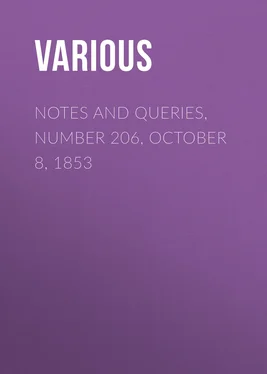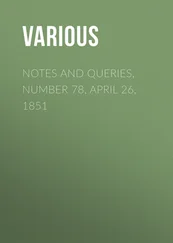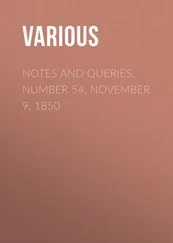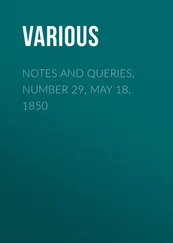Various - Notes and Queries, Number 206, October 8, 1853
Здесь есть возможность читать онлайн «Various - Notes and Queries, Number 206, October 8, 1853» — ознакомительный отрывок электронной книги совершенно бесплатно, а после прочтения отрывка купить полную версию. В некоторых случаях можно слушать аудио, скачать через торрент в формате fb2 и присутствует краткое содержание. Жанр: foreign_antique, periodic, foreign_edu, на английском языке. Описание произведения, (предисловие) а так же отзывы посетителей доступны на портале библиотеки ЛибКат.
- Название:Notes and Queries, Number 206, October 8, 1853
- Автор:
- Жанр:
- Год:неизвестен
- ISBN:нет данных
- Рейтинг книги:4 / 5. Голосов: 1
-
Избранное:Добавить в избранное
- Отзывы:
-
Ваша оценка:
- 80
- 1
- 2
- 3
- 4
- 5
Notes and Queries, Number 206, October 8, 1853: краткое содержание, описание и аннотация
Предлагаем к чтению аннотацию, описание, краткое содержание или предисловие (зависит от того, что написал сам автор книги «Notes and Queries, Number 206, October 8, 1853»). Если вы не нашли необходимую информацию о книге — напишите в комментариях, мы постараемся отыскать её.
Notes and Queries, Number 206, October 8, 1853 — читать онлайн ознакомительный отрывок
Ниже представлен текст книги, разбитый по страницам. Система сохранения места последней прочитанной страницы, позволяет с удобством читать онлайн бесплатно книгу «Notes and Queries, Number 206, October 8, 1853», без необходимости каждый раз заново искать на чём Вы остановились. Поставьте закладку, и сможете в любой момент перейти на страницу, на которой закончили чтение.
Интервал:
Закладка:
As my bill lay before me, I could not help thinking what an execrably bad taste our modern managers show in the extravagant and ridiculous announcement of the splendour of the star you come to contemplate! If Mr. Brooke have great merit, he needs not all this sound of trumpets; if he have it not, he is only rendered the more contemptible by it. I have some of the play-bills of John Kemble's last performances before me, and there is none of this fustian: the fact, the performance, and the name are simply announced. If our taste improves in some respects, it does not in this; it is a retrogression—a royal theatre sinking back into the booth of a fair. Shakspeare's and Byron's texts have been converted into the showman's explanations of panoramas: to what vile uses they may be next applied, there is no guessing. Poor Shakspeare! how I have pitied him, and you too, Mr. Editor, as I have seen him for so many months undergoing the operation of the teazle in "N. & Q.!" I hope there will be soon an end of this "skimble stuff," "signifying nothing."
But my observation upon the Drury Lane play-bill reminded me of one I have in my common-place book; and, as a correspondent and reader of "N. & Q.," I think it my duty to send it:
"To the Sovereign of Heaven—to the Mother of the Eternal World—to the Polar Star of Spain—to the Comforter of all Spain—to the faithful Protectress of the Spanish Nation—to the Honour and Glory of the Most Holy Virgin Mary—for her benefit, and for the Propagation of her Worship—the company of Comedians will this day give a representation of the Comic Piece called—
The celebrated Italian will also dance the Fandango, and the Theatre will be respectably illuminated."
William Robson.Stockwell.
SHAKSPEARE CORRESPONDENCE
The Meteorology of Shakspeare. —A treatise might be written on meteorology, and might be illustrated entirely by passages taken from the writings of "the world's greatest poet." "N. & Q." may not be the fitting medium for a lengthened treatise, but it is the most proper depository of a few loose Notes on the subject. Those who study Shakspeare should, to understand him, thoroughly study Nature at the same time: but to our meteorology. Recent observers have classified clouds as under:
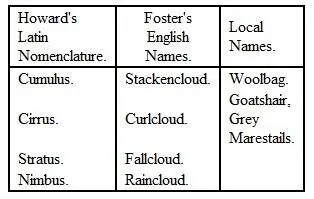
There are composite forms of cloud, varieties of the above, which need not be noticed here. The Cumulus is the parent cloud, and produces every other form of cloud known, or which can exist. Mountain ranges and currents of air of unequal temperatures may produce visible vapour, but not true cloud.
Cumulus. This cloud is always formed at "the dew point." The vapour of the lower atmosphere, at this elevation, is condensed, or rendered visible. In fog the dew point is at the surface of the earth; in summer it may be several thousands of feet above. The Cumulus cloud forms from below. The invisible vapour of the lower atmosphere is condensed, parts with its thousand degrees of latent heat, which rush upwards, forcing the vapour into the vast hemispherical heaps of snowy, glittering clouds, which, seen in midday, appear huge mountains of clouds; the "cloud-land" of the poet, floating in liquid air. The Cumulus cloud is ever changing in form. Cumulating from a level base, the top is mounting higher and higher, until the excessive moisture is precipitated in heavy rain, hail, or thunder showers.
The tops of the Cumulus, carried away by the upper equatorial currents, form the Cirrus clouds, which clouds must be frozen vapour, as they are generally from twenty to thirty thousand feet above the level of the sea. The base of the Cumulus is probably never more, in England, than five thousand feet high, rarely this. The Nimbus is the Cumulus shedding its vapour in rain; and the Stratus is the partially exhausted and fading Nimbus.
Poets in all ages have watched the clouds with interest; and Shakspeare has not only correctly described them, but has, in metaphor, used them in some of his sublimest passages. Ariel will "ride on the curled clouds" to Prospero's "strong bidding task" that is, ride on the highest Cirrus cloud, in regions impassable to man. How admirably the raining Cumulus (Nimbus cloud) is described in the same play:
" Trinculo. Here's neither bush 4 4 Bush , not brush, as misprinted in Knight's edition.
nor shrub, to bear off any weather at all, and another storm brewing. I hear it sing i' the wind: yond' same black cloud, yond' huge one, looks like a foul 5 5 Foul. Surely this ought to be full . A foul bumbard might be empty. "Foulness" and "shedding his liquor" are not necessarily contingent; but fulness and overflowing are. A full vessel, shaken, cannot choose "but shed his liquor."
bumbard that would shed his liquor …
… Yond' same cloud cannot choose but fall by pailfuls."
Hamlet points to a changing Cumulus cloud, when he says to Polonius, "Do you see that cloud, that almost in shape like a camel?"
" Pol. By the mass, and 'tis like a camel, indeed.
Ham. Methinks it is like a weasel.
Pol. It is back'd like a weasel.
Ham. Or like a whale?
Pol. Very like a whale."
But the finest cloud passage in the whole range of literature is contained in Antony and Cleopatra , painting, as it does, the fallen and wasting state of the emperor (Act IV. Sc. 12.):
" Ant. Eros, thou yet behold'st me?
Eros. Ay, noble lord!
Ant. Sometime we see a cloud that's dragonish:
A vapour, sometime, like a bear, or lion,
A tower'd citadel, a pendant rock,
A forked mountain, or blue promontory
With trees upon't, that nod unto the world,
And mock our eyes with air. Thou hast seen these signs:
They are black vesper's pageants.
Eros. Ay, my lord.
Ant. That which is now a horse, even with a thought,
The rack dislimns; and makes it indistinct,
As water is in water.
Eros. It does, my lord.
Ant. My good knave, Eros, now thy captain is
Even such a body: here I am Antony;
Yet cannot hold this visible shape, my knave."
Those who wish to understand this sublime passage must watch a bank of Cumulus clouds at the western sky on a summer's evening. The tops of the clouds must not be more than five or ten degrees above the apparent horizon. There must also be a clear space upwards, and the sun fairly set to the last stages of twilight. It will then be comprehended as to what is meant by "black vesper's pageants," and Warton and Knight will no more mislead by their note. It is only at "black vespers" that such a pageant can be seen, when the liberated heat of the Cumulus cloud is forcing the vapour into the grand or fantastic shapes indicated to the poet's eye and mind.
How truly does Antony read his own condition in the changing and perishable clouds. Shakspeare names or alludes to the clouds in more than one hundred passages, and the form of cloud is ever correctly indicated. Who does not remember the passages in Romeo and Juliet ? Much more might be written on this subject.
Robert Rawlinson.At the Hull meeting of the British Association, Mr. Russell, farmer, Kilwhiss, Fife, read a paper on "The Action of the Winds which veer from the South-west to West, and North-west to North." This he wound up by a reference to Shakspeare, which may be worthy of noting :
"In concluding, I cannot help remarking that this circuit of the wind from SW. by W. to NW. or N., from our insular position, imparts to our climate its fickleness and inconstancy. How often will our brightest sky become suffused by the blackest vapours on the slightest breach of SW. wind, and the clouds will then disappear as speedily as they formed, when the NW. upper current forces their stratum of moist air to rise and mingle with the dryer current above. I do not know who first noticed and recorded this change of the wind from SW. to NW., but the regularity of the phenomenon must teach us that the law which it obeys is part of a grand system, and invites us to trace its action. I do not think it will be out of place to point out the fact that the great English poet seems to have been quite familiar with this feature of our weather, not only in its most striking manifestations in the autumn and winter months, to which he especially refers, but even in its more pleasant aspects of summer. Shakspeare likens the wind in this shifting to an individual who pays his addresses in succession to two fair ones—first he wooes the North, but in courting that frigid beauty a difference takes place, whereupon he turns his back upon her and courts the fair South. You will observe the lines are specially applied to the winter season—
Читать дальшеИнтервал:
Закладка:
Похожие книги на «Notes and Queries, Number 206, October 8, 1853»
Представляем Вашему вниманию похожие книги на «Notes and Queries, Number 206, October 8, 1853» списком для выбора. Мы отобрали схожую по названию и смыслу литературу в надежде предоставить читателям больше вариантов отыскать новые, интересные, ещё непрочитанные произведения.
Обсуждение, отзывы о книге «Notes and Queries, Number 206, October 8, 1853» и просто собственные мнения читателей. Оставьте ваши комментарии, напишите, что Вы думаете о произведении, его смысле или главных героях. Укажите что конкретно понравилось, а что нет, и почему Вы так считаете.
